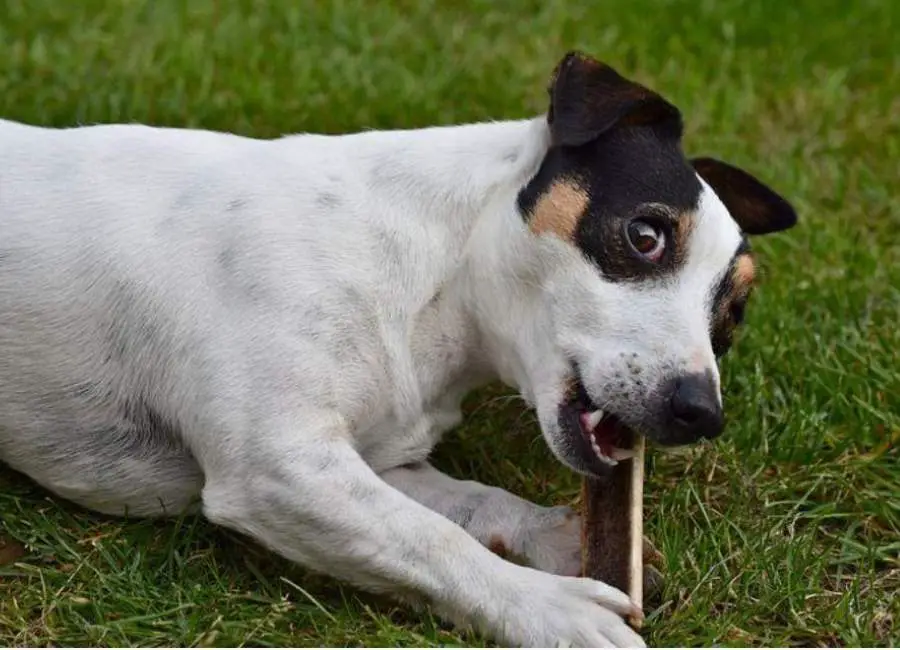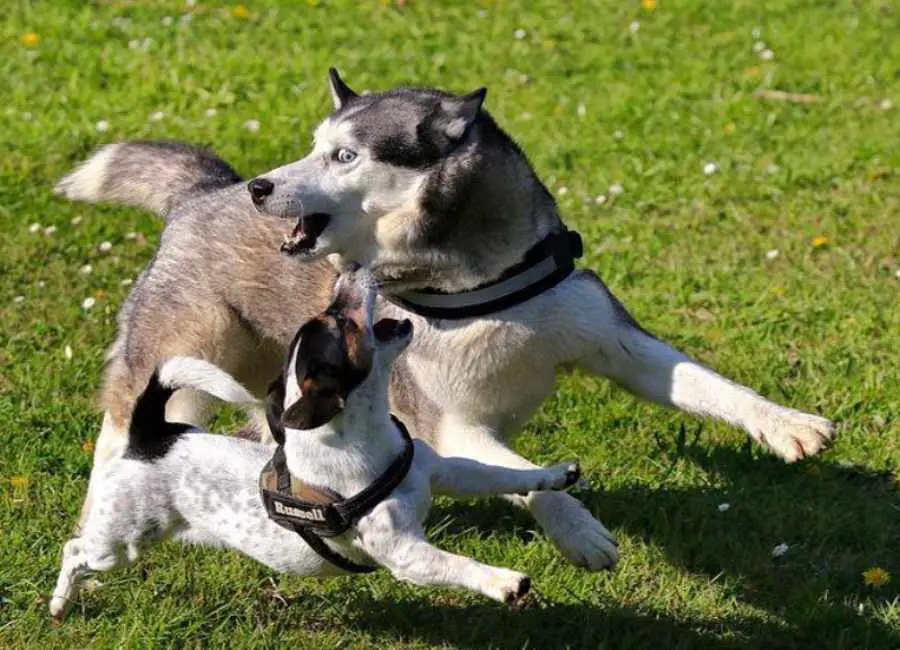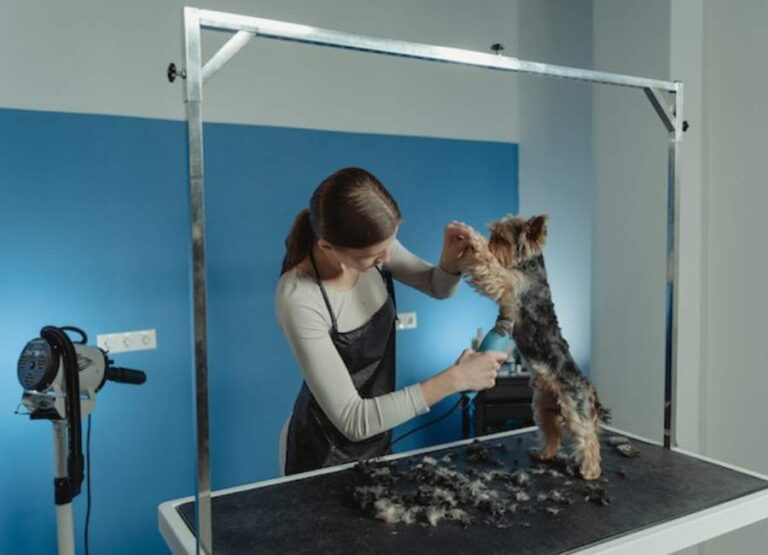9 Top Jack Russell Terrier Behavior Problems & Tips

Jack Russell terrier behavior problems can quickly become a concern for owners who did not make proper research before getting a Jack Russell.
In this post, you will be learning more about Jack Russell terrier behavior problems you should know before getting one.
I will also discuss some helpful tips for this Jack Russell terrier behavior problems, that is if you already have one.
Jack Russell terrier behavior problems
The following are some of the most typical Jack Russell behavior issues you should be aware of:
1. Excessive digging
One of the main issues with Jack Russell’s behavior that you must handle is this.
You need to find out why your Jack Russell is digging so much and act right now.
Try not to let your Jack Russell outside for extended periods of time and keep up frequent contact with him.
Jack Russells have a predisposition to dig for a number of reasons, none of which are cruel.
Don’t get upset or shout at your Jack Russell if he starts digging in your flower or plant beds while you’re out for a stroll.
Just repeatedly remove your Jack Russell from these situations until he understands that his behavior is wrong.
It is common for a Jack Russell to dig, however, they may do it for a variety of reasons, such as any of the following:
- Frustration
- Stress
- Anxiety
- Lack of mental stimulation
- Boredom
- To cool off
- Hunting instincts
- Excessive energy
- Loneliness, etc
Tips
How to resolve digging behavior in Jack Russell includes:
- Make the digging site unattractive by keeping things that will ward off your Jack Russell.
- Provide lots of engaging and interactive toys.
- Teach them to play the automatic retriever ball games with this.
- Provide more mental stimulation activities for your Jack Russell.
- Provide plenty of exercises.
- Use positive reinforcement.
- Eliminate your dog’s incentive to dig.
- Solve their separation anxiety.
2. Chasing things

For Jack Russell, chasing other animals, people, cars, or other moving objects is only one example of excitation impulses in action.
All of these activities can have dangerous and disastrous effects if you permit your Jack Russell to start chasing people, animals, or other dogs.
Chasing is a problem if the Jack Russell dog isn’t properly taught because it was created with a predatory instinct.
While you might not be able to stop your Jack Russell from chasing, you can take safety measures to prevent a disaster.
Tips
To prevent your Jack Russell from pursuing distractions, try these techniques:
- During any chase, distract and reward your Jack Russell.
- Keep your Jack Russell on a leash or in a fenced-in area to prevent distraction-chasing.
- Keep your Jack Russell on a leash whenever you go for a walk.
- Work on impulse control with your Jack Russell while teaching them to come when called.
- Early and effective socializing is beneficial.
- Teach your Jack Russell to remain calm among other animals, such as cats or dogs.
- Consult a dog behaviorist for help.
- When staying with your Jack Russell play movies of the side effects of dogs chasing things.
3. Jumping on things or people
In order to welcome you home and show you happiness, Jack Russell terriers are infamous for leaping and jumping on their owners.
Leaping is entertaining, but it’s not always acceptable, and this might quickly develop into a serious issue.
Jack Russell terriers are renowned for leaping up and down to welcome their owners and guests. Some folks could have an issue with this.
One of the simplest methods to stop your Jack Russell from leaping on you or someone else is to teach them to control their excitement.
Tips
Here are some general pointers for reducing excessive jumping in Jack Russell’s:
- When your dog is on a leash, have someone approach.
- Before the individual approaches your dog, scatter some treats on the ground.
- While your dog is eating off the floor, let the person pet him or her.
- Before your dog finishes eating, ask the person to move away from it.
- Repeat the previous steps a few times, but this time throw treats on the floor all along the greeting to extend it.
- Once all four feet are on the ground, let your dog meet the visitor before setting the first treat down.
- As your dog learns the rules, you could give him fewer and fewer treats until the only thing he gets is a greeting.
4. Excessive barking
One of the most prevalent Jack Russell behavior issues that are relatively simple to fix is barking.
Since they were created to hunt foxes, Jack Russell terriers are naturally non-aggressive dog that has been known to bark at other dogs or children.
Being properly socialized with your Jack Russell as soon as possible is one of the greatest ways to reduce excessive barking in Jack Russells.
Another means of communication for them is barking, which some owners could find bothersome.
Many things can cause a Jack Russell to become chatty, including:
- Strangers around
- Anxiety
- Play aggression
- Signs of hunger
- Emotional distress
- Fear
- Attention seeking
Tips
How to control excessive barking in Jack Russell include:
- Any barking that isn’t absolutely required should be ignored.
- Try to create a training schedule for your Jack Russell.
- To divert him, teach your Jack Russell to ignore other pets or humans.
- Make sure your Jack Russell is living in a calm environment.
- Provide a bark collar for your Jack Russell.
- Start socializing your Jack Russell puppy when he or she is young.
- Desensitize your Jack Russell to any potential phobia-inducing stimuli.
- Pay more attention to what your Jack Russell needs.
- Your Jack Russell should never experience worry or anxiety.
5. Separation anxiety
When Jack Russell is left alone for an extended period of time, separation anxiety in Jack Russell develops.
If untreated, separation anxiety can result in biting, excessive barking, and antagonism.
Jack Russells who experience separation anxiety may bite, nip, bark, isolate themselves, or engage in destructive chewing among other behaviors.
Having a friend or using proper crate training can help a Jack Russell who is left alone at home with their separation anxiety.
Tips
How to control separation anxiety in Jack Russell include:
- With your veterinarian’s approval, purchase anti-anxiety products.
- Make sure your Jack Russell has a lot of cuddly and engaging toys to keep him occupied.
- Give your Jack Russell plenty of time to rest, unwind, and exercise.
- Start your Jack Russell’s new, suitable crate training regimen.
- You should schedule a visit with a behaviorist for your Jack Russell.
- Teach them to keep their distance from you and to leave you alone at home.
- Before you go, walk your Jack Russell to burn off any excess energy.
- Allow a window to provide a glimpse of the outside world.
- Play relaxing music to create a calm and stress-free environment.
6. Little house training difficulty
The process of housetraining involves teaching a dog to go outside or in a designated location inside the home rather than acting on its ingrained need to poop everywhere.
A Jack Russell dog may have trouble housebreaking because of their domineering disposition.
Expect to work out in sessions for three to six weeks.
Don’t be angry with your Jack Russell dog since they may still make mistakes even after you’ve finished toilet training them because they have a small bladder.
You may anticipate seeing a cute Jack Russell that is aware of where to go potty once you’ve finished it.
As soon as you have your Jack Russell, try to concentrate on house training.
Tips
Here are some tips to help in-house training any Jack Russell:
- Be persistent
- Avoid yelling at your Jack Russell for making a mistake.
- Maintain a regular work schedule.
- Reward positive actions.
- Crate training should begin as soon as feasible.
- The house-training process should be repeated until you are pleased.
- Associate positive actions with effective house training.
- Never employ negative reinforcement; always use positive reinforcement.
7. Jack Russell doesn’t really welcome strangers
The tendency towards shyness or being hostile is also seen in Jack Russell terriers.
If you want to know if a Jack Russell is hostile or shy, you need to look at its ears when strangers are around your house.
A Jack Russell who is shy or hostile may bend his ears down against his head when he is among unfamiliar people.
Jack Russell terriers are known to bark at strangers for this reason.
When dogs are close to unfamiliar humans, they pant hard and their pupils enlarge.
These are both signs of nervousness that can be seen in many Jack Russell terriers.
Before Jack Russell overcome his hostility or shyness, you must first convince him that there is nothing to be scared of.
Tips
How to help Jack Russell terriers to accept strangers include:
- At dog parks, introduce your Jack Russell to other canines and people.
- Give your Jack Russell exposure to loud music or noises.
- Ask other dog owners for advice.
- Enter your Jack Russell in a dog competition.
- Go camping with your Jack Russell.
- Bring your Jack Russell to work so that everyone may meet him.
- Visit your friends with your Jack Russell.
- Take nightly strolls down your block.
- Early socialization of your Jack Russell is important.
8. Jack Russell terriers do get clingy
The fact that their Jack Russell follows them around the house annoys some people, while it amuses others.
When it comes to barking, biting, or nipping in order to attract attention, Jack Russell terriers are no exception.
A Jack Russell is not the dog for you if you don’t want a devoted companion who requires ongoing attention.
While Jack Russell terriers are wonderful companions that spend their days with their owners, they can develop major behavioral issues if they are not properly taught.
Tips
How to control clingy behavior in Jack Russell terriers which include:
- Obedience training should come first.
- Teach your Jack Russell to sit and stay commands.
- Give your Jack Russell plenty of time to get properly crate-trained.
- Offer a wide range of entertaining and captivating toys.
- Give puzzles and other stimulating mental workouts.
- Always assign your Jack Russell a task to do.
- Create and adhere to a daily agenda for yourself.
- Ensure that there are established ground rules.
9. Jack Russell terriers can become destructive
One of the most prevalent Jack Russell behavior issues is the need to chew things.
All dogs chew, but if your Jack Russell chews on objects like shoes, furniture, or electrical wires that aren’t meant to be eaten, chewing may rapidly turn into a problem.
Give your Jack Russell lots of toys and chews to keep him or her active and promote good chewing habits.
You can remove anything that you don’t want chewed on or spray them with Bitter Apple to make them taste awful.
Tips
How to control Jack Russell’s destructive behavior include:
- Never let your Jack Russell unattended for a long time.
- Buy a lot of chew toys for your Jack Russell to keep him or her busy.
- Spray your priceless furniture to deter your Jack Russell from chewing on it.
- Give your Jack Russell some extra mental exercise.
- Provide additional opportunities for exercise for your Jack Russell.
- Protect your home from puppies.
- Avoid Jack Russell separation anxiety at all costs.





![Dog Hiding Under Bed And Not Eating [Helpful Tips] Dog Hiding Under Bed And Not Eating](https://petcreeks.com/wp-content/uploads/2023/02/Dog-Hiding-Under-Bed-And-Not-Eating-768x555.jpg)
